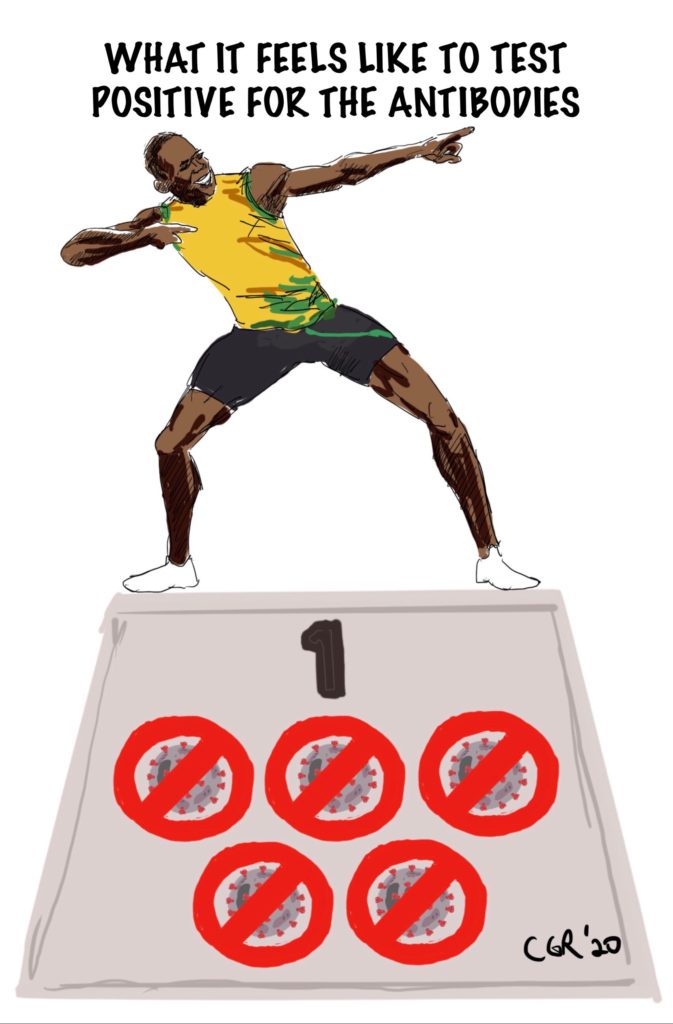
There is a profound irony in wanting to have definitive and scientific evidence that I had an illness (“Who out there wants a disease?”—“ME!!”—“You got it, you win!”) but that is the kind of time we live in, the pandemic paradox. Regardless of what the WHO says, the hope is that the antibodies confer a good level of immunity. This was definitely one of the tests in my life that I did not want to fail.
But, in fact, at first, I did. Or I thought I did. I took the test on a Thursday and I received the result in my inbox Monday morning. I read the message, full of medical verbiage that I did not understand (“Captain, I’m an engineer not a doctor!”) and the only part I could make heads or tails of was this:
Component
COVID-19 IGG
Your Value
TNP INDEX
Standard Range
<1.4 INDEX
Index (S/C) Value Interpretation
< 1.4 Negative
My value was TNP INDEX! I didn’t even HAVE a value. After all that anxiety ridden suffering in March all I got was TNP INDEX? I had failed this all important test.
You can imagine what this did to my mood. I actually felt happy and light hearted in the days preceding this result. That is not how I felt after. Of all the feelings I had, the most prominent I had was confusion. If I didn’t have covid-19 in March, what caused the fever, the weakness, the pain, the cough, the loss of weight, the headaches and the other symptoms that you would rather not read about. You mean there’s another monster out there?!
Monday evening I received a follow-up message:
Component
COVID-19 IGG
Your Value
6.9%
Standard Range
<1.4 INDEX
And it contained these magic words from my doctor: “This indicates that you did, indeed, have covid-19”. I hit the jackpot!
I am very well aware that the WHO said in April that there is absolutely no evidence that the antibodies provide immunity from covid-19. That statement confused me when I first heard it. Why would we need evidence when it’s a principle in biology, virology and immunology that antibodies are deployed by the body to protect against specific antigens. Every high school student on earth learns this. Why wouldn’t I be immune? I asked my doctor this very question. In fact, I asked him if there are any infectious diseases that, once contracted, don’t confer protection against reinfection.
“Hepatitis-C”, he answered. To be clear, he said “C”. Not hepatitis-A or B. “C”. The dreaded C. The reason is that there is enormous genetic variability with the hepatitis-C virus. Your body can generate the antibodies for a specific version of hep-C and then you can be attacked by different genetic version. This happens to drug addicts all the time, my doctor told me. They use dirty needles, come down with hep-C, use needles again, they are infected again by a different version of hep-C. And, of course, there’s HIV—the virus that causes AIDS. A vaccine is unlikely, as well, and for largely the same reason.
Fortunately for me, it seems that SARS-COV-2 doesn’t mutate that quickly. There are only a handful of strains of SARS-COV-2 and they aren’t that genetically distinct from each other. My antibodies are likely to confer some level of immunity for some period of time.
This is fortunate for the world, as well. If antibodies don’t confer protection, there is no point in developing a vaccine, since their primary function is to force the body to generate antibodies.
What this really means for you is that you should celebrate with me. Antibody protection means that the vaccine will work and that you’ll be safe, as well—and that the world will become recognizable again and soon enough.